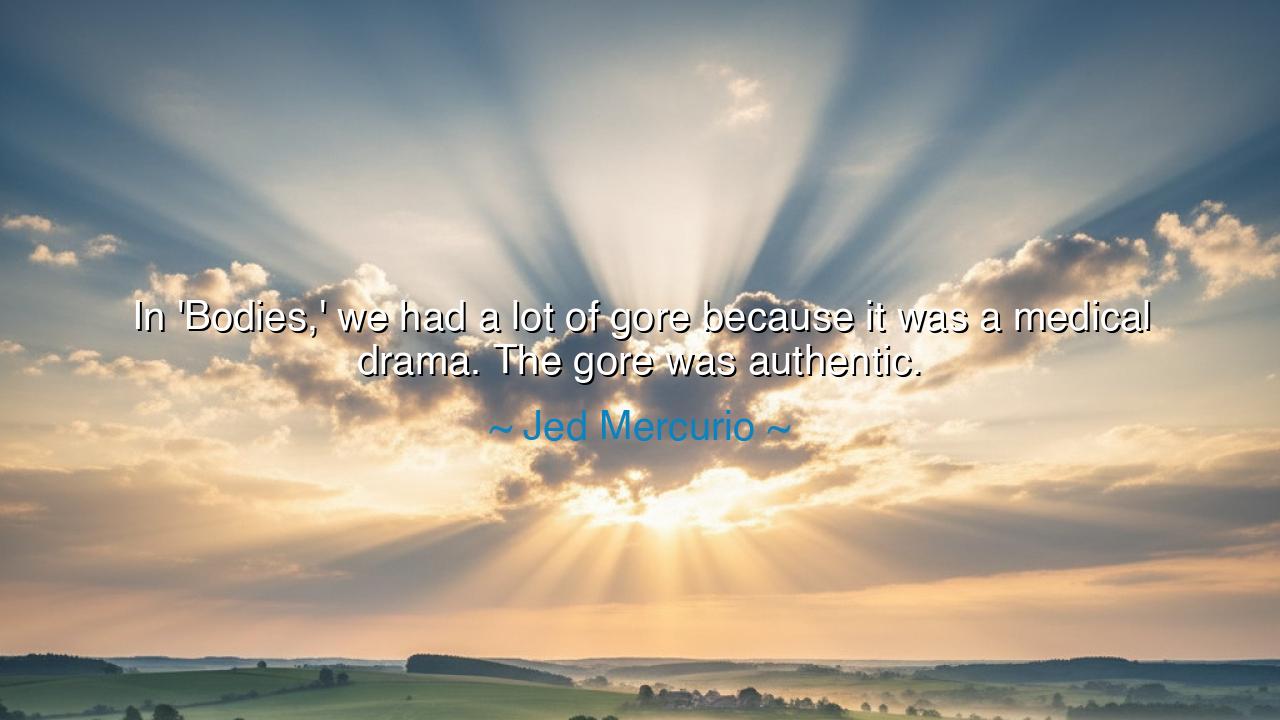
In 'Bodies,' we had a lot of gore because it was a medical drama.
In 'Bodies,' we had a lot of gore because it was a medical drama. The gore was authentic.






The words of Jed Mercurio—“In ‘Bodies,’ we had a lot of gore because it was a medical drama. The gore was authentic.”—may at first seem simple, even clinical, but beneath them lies a profound truth about authenticity, art, and the courage to face the human condition. Mercurio, himself a former physician turned storyteller, reminds us that truth—especially the truth of flesh, suffering, and mortality—cannot be softened without losing its power. In his drama Bodies, the “gore” was not a spectacle of horror, but a mirror reflecting the fragile and sacred nature of life itself. To call it “authentic” is to honor the reality that healing and pain, life and death, beauty and blood are all woven together in the same tapestry of existence.
In the ancient world, truth in art was called aletheia—the unveiling of what is hidden. Mercurio’s insistence on authenticity in portraying the world of medicine follows in this lineage. The surgeon’s table, like the artist’s canvas, reveals truths that the world prefers to hide. In hospitals, as in temples of old, the veil between life and death is thin. The gore, the viscera, the harshness of the human body laid open—all are reminders that beneath our polished words and dignified attire, we are beings of flesh and frailty. The ancients knew this well: in Rome, after triumphs, generals were whispered to by slaves—“Memento mori,” remember you are mortal. So too does Mercurio’s realism whisper to modern audiences, reminding them of what they forget: that the human story is one of both majesty and mortality.
The origin of this quote arises from Mercurio’s own life journey—from medicine to storytelling. Before he wrote scripts that captured millions, he stood in operating theaters, witnessing firsthand the raw, unfiltered reality of the human body. When he created Bodies, he did not invent that world; he translated it. The authenticity of the gore was not designed to shock, but to tell the truth of those who serve in medicine—their courage, their mistakes, their quiet battles between compassion and detachment. Just as a soldier’s scars tell of war, the physician’s memories tell of the battlefield of life and death. The gore, then, is not decoration—it is testimony.
Consider how truth, when shown without disguise, has always unsettled yet enlightened humanity. When Rembrandt painted The Anatomy Lesson of Dr. Nicolaes Tulp in the seventeenth century, his depiction of a public dissection stirred both awe and discomfort. But through that discomfort, people learned reverence for knowledge, for the sacred courage it takes to confront mortality. Likewise, Mercurio’s “authentic gore” performs the same moral act—it forces us to look, to feel, to reckon. For only by acknowledging the ugliness of life do we begin to truly appreciate its beauty. Those who avert their gaze from pain also blind themselves to compassion.
In a deeper sense, the gore symbolizes truth itself—unpleasant, messy, yet undeniably real. Our world, obsessed with illusion, often hides what is difficult to face. We prefer polished surfaces, filtered realities, and narratives that comfort rather than challenge. Mercurio’s choice to embrace authenticity is an act of artistic bravery—a refusal to lie. Just as ancient philosophers like Socrates demanded that people confront their ignorance, Mercurio demands that audiences confront the truth of the human body: that healing is not clean, that life is not sanitized, and that even in the midst of blood and chaos, there dwells dignity and grace.
The lesson within his words reaches far beyond the realm of television. It teaches that truth, though uncomfortable, is sacred. Whether one is a doctor, an artist, or an ordinary soul navigating life’s hardships, authenticity is the path to understanding. To hide reality, to paint over pain, is to deny growth. The wise must learn, as Mercurio has, that beauty lies not in perfection but in honesty—in showing the world as it truly is, even when it bleeds. For only when we see clearly can we begin to heal deeply.
Therefore, let these words of Jed Mercurio stand not merely as commentary on art, but as a parable for all who seek meaning: do not fear the rawness of truth. Whether in the hospital, the home, or the heart, authenticity is the only light that pierces the shadows of illusion. When life reveals its gore—its grief, its suffering, its scars—do not turn away. Look with compassion. Learn from it. For in that fearless gaze lies the essence of both art and wisdom: to confront what is real, and in doing so, to honor the fragile, magnificent miracle of being human.






AAdministratorAdministrator
Welcome, honored guests. Please leave a comment, we will respond soon